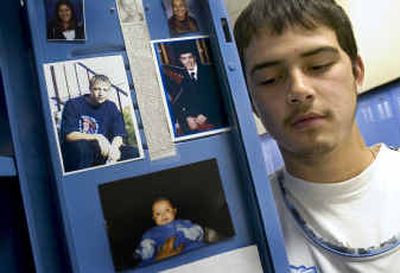Deaths teach lessons in life

WELLPINIT, Wash. – The recent deaths of two high school students inspired classmates in this Indian reservation community to draw upon traditional and modern teachings to cope with the tragedy.
Students from Wellpinit School dug the graves and offered support and food, including freshly smoked deer meat. At the wake they shared their feelings.
“Something in their heart told them to do that,” said Pat Moses, a veteran teacher at Wellpinit School.
Remembrances also came from the eight-man football team that played two downs with seven players – a missing-man formation to show their respect. A basket passed around the stands by a student drew $571 for funeral costs. A Wellpinit car wash is planned Friday to raise money for both families.
“A lot of these boys and girls became young adults as a result of this,” Moses said.
Student body President Robert McCoy died Sept. 25 in a motorcycle accident. The outgoing McCoy was famous among students for his unshakable good humor. He ran track and was on the football team.
McCoy’s funeral was Sept. 29. Just hours after the funeral ended, word started circulating about a second student death. This time it was a shooting.
Blu Madera died from a gunshot to the head, according to the Stevens County Sheriff’s Office. At first, the shooting was considered self-inflicted. Now officials are investigating the death as a possible homicide.
Madera was a serious athlete who was known to ask good questions in class. He was also on the football, track and wrestling teams.
Both Madera and McCoy were juniors at Wellpinit’s high school.
Student Bazil Peone returned to classes Monday after a week off to cope with funerals and wakes.
Many students missed a couple of days.
“This was tough on a lot of people,” Peone said. “Those two were well known. They were everyone’s friend.”
‘We wanted to help’
During a break between classes Monday in Wellpinit, the class of about 25 juniors retrieved books from their lockers. As the metal doors swung open on junior row, almost every locker had photos of both classmates taped inside.
Off to the side, separated by four lockers, were McCoy’s and Madera’s lockers – each covered with poems, photos and well-wishes scrawled onto the blue doors.
Teachers and administrators met after the boys’ deaths to discuss how they could best help students, said Wellpinit Superintendent Reid Riedlinger, who’s retiring at year’s end after 14 years at the school.
The ninth through 12th grades at Wellpinit have about 100 students, 93 of whom are Native American. Almost 75 percent of the students qualify for free or reduced lunch.
But about 90 percent of students are expected to graduate. The state average is around 66 percent.
Classrooms are wealthy with new computers. A plasma television mounted in the hallway is proof of past high-tech grants.
None of that seems to matter in times like this.
“More than anything, we wanted to help them with their devastation,” Riedlinger said.
The community responded quickly to the first tragedy. A group of Native American elders was invited into the school.
Gathering during hard times is very much the Indian way, said Moses, the veteran teacher.
For the first death, the junior class was brought to meet with the elders where they gathered in a circle.
“A lot of them were too emotional to say the things they wanted to say,” Moses said.
The elders are always willing to drop everything to come where they are needed, he said.
“In a sense, every student here is like their grandchild,” Moses said. “That’s the Indian way.”
‘A big step’
During the first wake and funeral, and then again for the second, Moses saw something come alive in many of the students, who acted as if they’d been well-schooled in the traditional ways of their elders.
Without being asked, they offered to help by setting up tables at the wake. Some brought food. The young men also helped dig the graves at the cemetery.
And during the wake many of the students appeared before the group and spoke from their hearts.
“It’s a big step to get up and talk and let out your inner feelings,” Moses said.
Taped to a locker was a poem hoping for these to be the last losses of the year.
“What about our mothers? All they can do is hope not another,” read one poem.
To help with the situation, Educational School District 101, a multicounty education support organization, deployed a group of crisis counselors Friday and Monday.
Teachers were also offered a chance to talk.
Jane Swiatek said she probably needed to vent a little.
Swiatek had coached McCoy on the track team. During van trips for the six-person squad, she’d put him next to her because she knew he’d talk for the entire trip to entertain her and ensure that she’d stay wide awake as she drove.
“He could talk for four hours,” she said.
Through old student essays she held in her hands, she knew both students’ dreams.
McCoy wanted to learn how to cook, bench-press 130 pounds and visit New York City – twice.
Madera wanted to attend college, get a job, buy a house, start a family and “travel a lot.”
Sometimes it was hard getting McCoy to keep quiet. Madera was more introspective. Swiatek said her teaching style is lively, even goofy at times, which drew looks from Madera.
“He used to look at me and say, ‘You’re crazy,’ ” Swiatek said. She wondered if she was reaching him.
At the funeral, family told Swiatek how much he looked up to her. Days after her silly jokes, he’d start laughing.